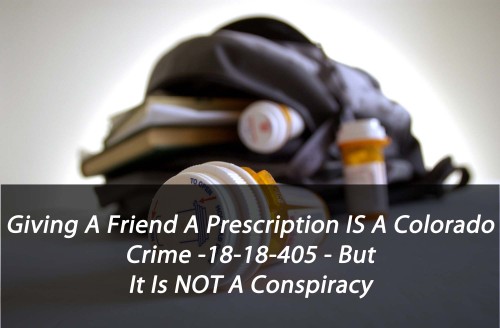




Jul 22
Giving A Friend A Prescription IS A Colorado Crime -18-18-405 – But It Is NOT A Conspiracy

By H. Michael Steinberg Colorado Drug Crimes Criminal Defense Lawyer
Giving A Friend A Prescription IS A Colorado Crime -18-18-405 – But It Is NOT A Conspiracy – The dangers of giving a friend at work, at home, or on vacation – anywhere – a prescription drug which drug was written as a prescription only to you – are very real.
The bad news is a recent Colorado case affirmed that even a gift of your prescription drug is the same as selling the drug. Put differently, a “distribution” of drugs to a friend is the same – in the eyes of Colorado law – as “dealing” in drugs.
The good news is you cannot be charged with the additional count of Conspiracy to sell drugs.
The evidence in the new case – established that the “transferor” of Tylenol 3 who intended only to give the drugs to her office friend – (the transferee)- who used the drugs ONLY for personal use (cramps) was illegal but was not a Conspiracy.
In the Lucero case – Lucero’s co-worker owned a prescription for Tylenol 3. Lucero was given – free of charged – several tablets over time for Lucero’s pain – The drugs were shared with no one else and this occurred at the workplace.
The Colorado “Buyer-Seller” Rule
The law in Colorado in Colorado is that evidence of a buyer-seller relationship, without more, does not constitute a “conspiracy” to distribute a controlled substance
This principle has been called the “‘buyer–seller rule,” the “buyer-seller exception,” the “retail buyer rule” and the “personal consumption rule.” While it a misnomer to call the exchange between Lucero and her co-worker a sale – the transfer fits under the “buyer-seller” concept.
An exchange – even a sale for a buyer’s personal consumption, does not constitute a “conspiracy.” A transfer for “payment” for the drug is not an important distinction.
To summarize, whether the “transferor-transferee” relationship involves a paid or unpaid transfer of a controlled substance, it is STILL A CRIME to transfer the drug. Because, the transferee intends only to obtain the drugs from the prescription holder, there can be no “unification objective” because the parties – the friends in this case – have different intentions: one has the intention to give the drugs, and the other has the intention to obtain the drugs for personal use.
The consumer of the drug does not share the distribution objective of the seller and thus cannot be part of a “conspiracy” to distribute the controlled substance.
What Follows Is Colorado’s Controlled Substance Distribution, Manufacturing, Dispensing, or Sale Statute – 18-18-405.
§ 18-18-405. Unlawful Distribution, Manufacturing, Dispensing, or Sale
(1) (a) Except as authorized by part 1 of article 42.5 of title 12, C.R.S., part 2 of article 80 of title 27, C.R.S., or part 2 or 3 of this article, it is unlawful for any person knowingly to manufacture, dispense, sell, or distribute, or to possess with intent to manufacture, dispense, sell, or distribute, a controlled substance; or induce, attempt to induce, or conspire with one or more other persons, to manufacture, dispense, sell, distribute, or possess with intent to manufacture, dispense, sell, or distribute, a controlled substance; or possess one or more chemicals or supplies or equipment with intent to manufacture a controlled substance.
(b) As used in this subsection (1), “dispense” does not include labeling, as defined in section 12-42.5-102(18), C.R.S.
(2) Except as otherwise provided for an offense concerning marijuana and marijuana concentrate in section 18-18-406 and for special offenders as provided in section 18-18-407, any person who violates any of the provisions of subsection (1) of this section:
(a) Commits a level 1 drug felony and is subject to the mandatory sentencing provisions in section 18-1.3-401.5(7) if:
(I) The violation involves any material, compound, mixture, or preparation that weighs:
(A) More than two hundred twenty-five grams and contains a schedule I or schedule II controlled substance; or
(B) More than one hundred twelve grams and contains methamphetamine, heroin, ketamine, or cathinones; or
(C) More than fifty milligrams and contains flunitrazepam; or
(II) An adult sells, dispenses, distributes, or otherwise transfers any quantity of a schedule I or schedule II controlled substance or any material, compound, mixture, or preparation that contains any amount of a schedule I or schedule II controlled substance, other than marijuana or marijuana concentrate, to a minor and the adult is at least two years older than the minor;
(b) Commits a level 2 drug felony if:
(I) The violation involves any material, compound, mixture, or preparation that weighs:
(A) More than fourteen grams, but not more than two hundred twenty-five grams, and contains a schedule I or schedule II controlled substance;
(B) More than seven grams, but not more than one hundred twelve grams, and contains methamphetamine, heroin, ketamine, or cathinones; or
(C) More than ten milligrams, but not more than fifty milligrams, and contains flunitrazepam;
(II) An adult sells, dispenses, distributes, or otherwise transfers any quantity of a schedule III or schedule IV controlled substance or any material, compound, mixture, or preparation that contains any quantity of a schedule III or schedule IV controlled substance to a minor and the adult is at least two years older than the minor;
(c) Commits a level 3 drug felony if the violation involves any material, compound, mixture, or preparation that weighs:
(I) Not more than fourteen grams and contains a schedule I or schedule II controlled substance;
(II) Not more than seven grams and contains methamphetamine, heroin, ketamine, or cathinones;
(III) Not more than ten milligrams and contains flunitrazepam; or
(IV) More than four grams and contains a schedule III or schedule IV controlled substance;
(d) Commits a level 4 drug felony if:
(I) The violation involves any material, compound, mixture, or preparation that weighs not more than four grams and contains a schedule III or schedule IV controlled substance; or
(II) Notwithstanding the provisions of paragraph (c) of this subsection (2), the violation involves distribution or transfer of the controlled substance for the purpose of consuming all of the controlled substance with another person or persons at a time substantially contemporaneous with the transfer; except that this subparagraph (II) applies only if the distribution or transfer involves not more than four grams of a schedule I or II controlled substance or not more than two grams of methamphetamine, heroin, ketamine, or cathinones;
(e) Commits a level 1 drug misdemeanor if the violation involves:
(I) A schedule V controlled substance; or
(II) A transfer with no remuneration of not more than four grams of a schedule III or schedule IV controlled substance.
…
(5) When a person commits unlawful distribution, manufacture, dispensing, sale, or possession with intent to manufacture, dispense, sell, or distribute any schedule I or schedule II controlled substance, as listed in section 18-18-203 or 18-18-204, flunitrazepam, ketamine, or cathinones, or conspires with one or more persons to commit the offense, pursuant to subsection (1) of this section, twice or more within a period of six months, without having been placed in jeopardy for the prior offense or offenses, the aggregate amount of the schedule I or schedule II controlled substance, flunitrazepam, ketamine, or cathinones involved may be used to determine the level of drug offense.
Giving A Friend A Prescription IS A Colorado Crime – 18-18-405 – But It Is NOT A Conspiracy
If you found any of the information I have provided on this web page article helpful please click my Plus+1 or the Share buttons for Twitter and Facebook below so that others may also find it.
The reader is admonished that Colorado criminal law, like criminal law in every state and at the Federal level, changes constantly. The article appearing above was accurate at the time it was drafted but it cannot account for changes occurring after it was uploaded.
If, after reading this article, you have questions about your case and would like to consider retaining our law firm, we invite you to contact us at the Steinberg Colorado Criminal Defense Law Firm – 303-627-7777.
Never stop fighting – never stop believing in yourself and your right to due process of law. You will not be alone in court, H. Michael at your side every step of the way – advocating for justice and the best possible result in your case.
 ABOUT THE AUTHOR: H. Michael Steinberg – Email The Author at [email protected] – A Denver Colorado Criminal Defense Lawyer – or call his office at 303-627-7777 during business hours – or call his cell if you cannot wait and need his immediate assistance – 720-220-2277. Attorney H. Michael Steinberg is passionate about criminal defense. His extensive knowledge and experience of Colorado Criminal Law gives him the edge you need to properly handle your case.
ABOUT THE AUTHOR: H. Michael Steinberg – Email The Author at [email protected] – A Denver Colorado Criminal Defense Lawyer – or call his office at 303-627-7777 during business hours – or call his cell if you cannot wait and need his immediate assistance – 720-220-2277. Attorney H. Michael Steinberg is passionate about criminal defense. His extensive knowledge and experience of Colorado Criminal Law gives him the edge you need to properly handle your case.
“A good criminal defense lawyer is someone who devotes themselves to their client’s case from beginning to end, always realizing that this case is the most important thing in that client’s life.”
You should be careful to make a responsible choice in selecting a Colorado Criminal Defense Lawyer – and we encourage you to “vet” our firm. Over the last 40 plus years – by focusing ONLY on Colorado criminal law – H. Michael has had the necessary time to commit to the task of constantly updating himself on nearly every area of criminal law, to include Colorado criminal law and procedure and trial and courtroom practice. H. Michael works hard to get his clients the best possible results in and out of the courtroom. He has written, and continues to write, extensively on Colorado criminal law and he hopes this article helps you in some small way –
iving A Friend A Prescription IS A Colorado Crime -18-18-405 – But It Is NOT A Conspiracy.
You Might Also Enjoy:
- Colorado Drug Prescription Fraud – Can The Doctor Testify Against Me?
- Colorado Prescription Fraud Charges – Understanding Why People Become Addicted To Painkillers And Heroin
- 2015 Colorado’s Prescription Drug Monitoring Programs (PDMPs) – A Prescription Fraud Trap Deepens
- The New Colorado Prescription Drug Monitoring Program – Closing In On Colorado Prescription – “Script Fraud” Obtaining Controlled Substances By Fraud and Deceit: 18-18-415
- Colorado Searches of Cell Phones At The Time Of An Arrest – Can They Do That












